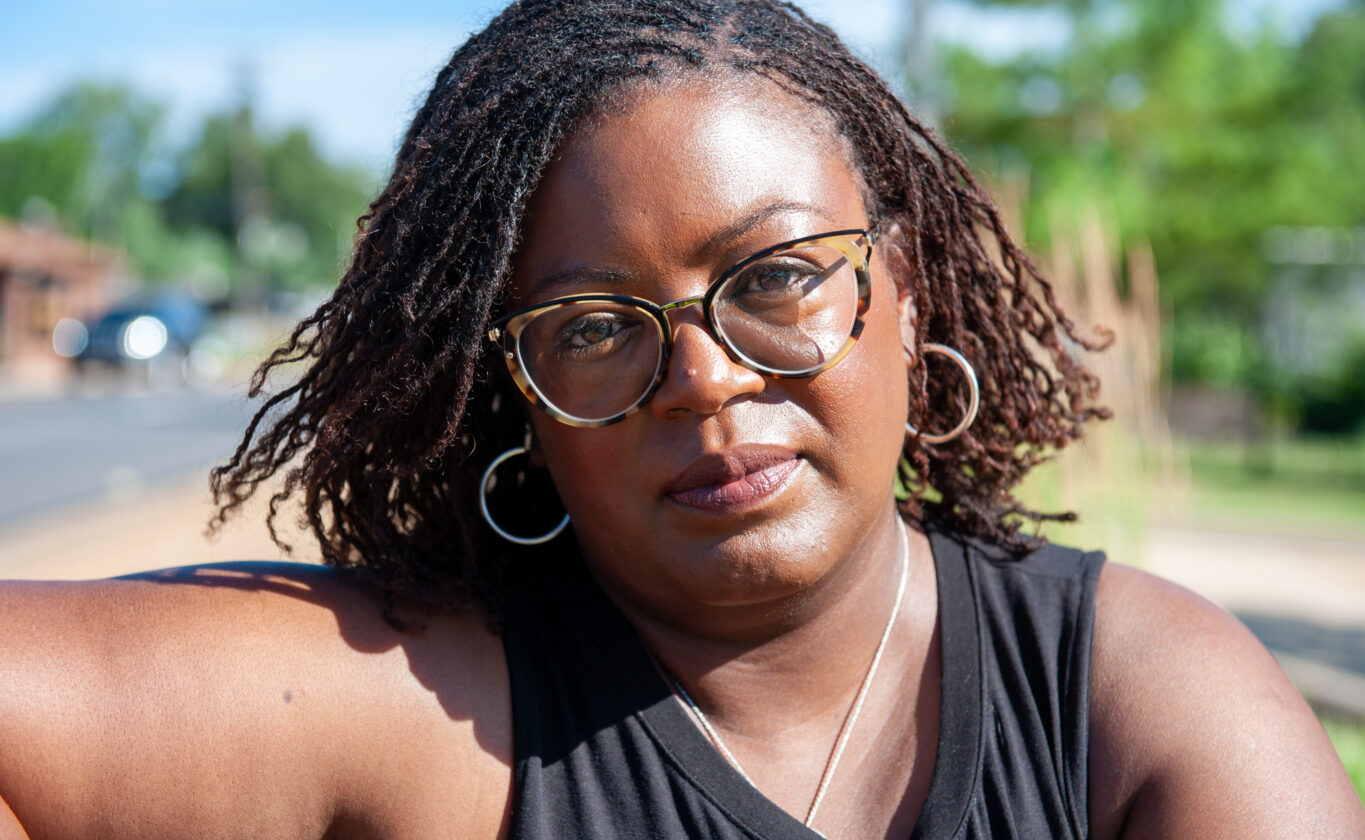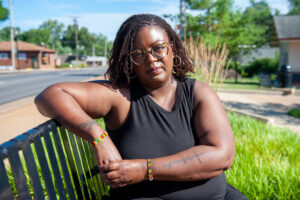
Photo Credit: Lindy Drew / Humans of St. Louis
Erika: I have a 16-year-old daughter with mental health issues and we moved to Ferguson last year. She has ADHD and PTSD. She also has a dysfunctional and dysregulated mood disorder. Trying to get care has been hard. A lot of psychiatrists have waiting lists, but we finally got into a place a few months ago. She had an appointment with the psychiatric nurse practitioner and we’re still waiting to find a talk therapist. She’s a sophomore in high school. Very creative. And anything to do with art, music, dancing, drawing, and painting she loves to do. She likes customizing skateboard decks. She takes voice lessons at COCA. And she has a mind of her own. She identifies as gender fluid and changed her name. We already had an issue at her school where the principal called her by her dead name and told my daughter she could call her by whatever name was on her birth certificate if it wasn’t legally changed yet. The principal wanted to have my daughter removed from school for yelling at her because of that. So I had to rally the troops to prevent that from happening. My daughter’s still at her school, but when it comes to her mental health, she’s a teenager on steroids it seems. She can get pretty worked up and aggressive to where I don’t feel like I can manage it on my own. At the same time, it’s scary for me as a Black woman to call the police when my Black child is acting out.
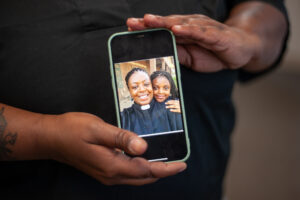
We’re from South Bend, Indiana. She has an older brother and he still lives there. Her father died by suicide. I’m remarried and my husband lives in Ghana. We’re in the process of getting him here on a spousal visa, but that’s a work in progress. So I’ve been parenting on my own while I put myself through seminary and through the ordination process.
Before I went to seminary, I was homeless. We moved a lot. At one point, we lived in a shelter and then we got an apartment but were evicted. We stayed with my mom for a while, But, eventually, she told me my time was running out. During that time, I was an EMT and really interested in chaplaincy. I started volunteering in the spiritual care department at Memorial Hospital in South Bend, Indiana when the director suggested I apply for seminary. I thought, “I don’t have a bachelor’s degree. I’m not going to get into a program.” She told me to apply anyway. I did and I got in.
We moved to Cambridge, lived in Harvard Square, and I went to school while working at MIT in their medical clinic. I took classes at Episcopal Divinity School and Harvard Divinity School, so my daughter got to go to class with me sometimes. I remember saying, “I can’t believe I’m sitting here as a single mom in the back of a classroom at Harvard with Dr. Cornel West as the lecturer.” At that moment, I realized how important access is. And how my daughter’s story would be shaped by getting out of Indiana and getting to travel across the country and out of the country because of the opportunities I had.
I got my first job in California. Then I did a broad search to look for another job, and there was a church hiring in University City. But I got the inside scoop about the job I have now and that’s how I ended up here. Ferguson got me. I remember my daughter said, “Mom, you took us out of the hood and brought us back.” With so many gunshots, it sounded like we were in a war. After our first New Year’s Eve here, she said, “We’ve got to move. Like, tomorrow.”
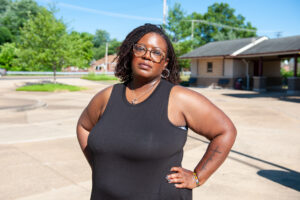
I had to call 911 for my daughter in D.C., Boston, and California. And they were different experiences than calling in St. Louis. It always happens when she’s getting aggressive and destroying things in the house and I’m not sure if she’s going to hurt me. In Cambridge, they have certain police designated for mental health crises. They have a diversion program, so they know how many kids with mental health issues are in the area. That first time I called in Boston, the police came. They were very understanding. They called the ambulance and the ambulance took her to the hospital.
Another time I called, she was 13 and in the eighth grade. We were living in Virginia and she hit me. In that state, anytime there’s a domestic violence call, someone has to go to jail. So she went in handcuffs because she was upset and they didn’t want her to run off. They brought her back the same night though — took her, booked her, and brought her back two hours later. I was able to decide whether or not I wanted to press charges. I didn’t, so it got dropped. I was hoping it would be a learning opportunity. But it wasn’t. She said the police didn’t take her into any scary rooms or anything. They were nice and joked with her. When she came home, she was still upset that I called the police on her. She said I was ruining her life and now she’d have this on her record.
It’s hard because sometimes I feel like I’m in a domestically abusive relationship with my child and I don’t feel supported. Most of the time I feel like as the adult I’m expected to de-escalate the situation. We’d been going to family counseling, too. But what am I supposed to do? Just let her hit me? That makes no sense.
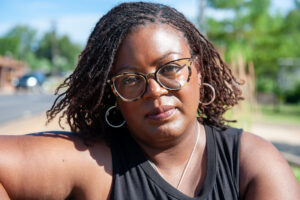
In California, I had to call 911 because my daughter and I were in the car and she wanted money. She was biting my arm and I couldn’t get away from her. The hospital was near us, so I tried to go there, but she jumped from the moving car and took off. So I had to call the police to find her. Once they caught up with her, they made sure nothing was broken and she wasn’t injured. Then she was involuntarily detained for a 72-hour psychiatric hospitalization. They sent her to a mental health facility over an hour away. Because of COVID, I couldn’t visit her. With children’s placements, they can send them anywhere in the state where there are openings even if you don’t have a way to get to them. I had to take her clothes to her, but I couldn’t actually see her until about three weeks later when I could pick her up.
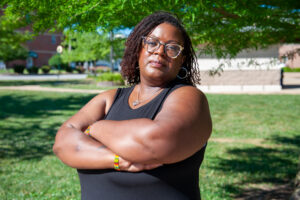
Every time I have to call the police for my daughter, I’m always hopeful that she’ll gain some skills or people will tell me she learned something so we won’t have to continue having these situations. When she gets to the hospital, she’s calm. She can go from 0 to 100, but once it’s over, it’s over. So if she’s in the hospital and they can’t see it, they can’t treat it. They’ll just send her home. That’s frustrating.
She did have a therapist who told me, “Every time she gets aggressive, call the police.” And it’s like, “I can’t do that. My daughter is a little Black girl. And I’m afraid. I don’t want to have to think about the police killing my child. I would feel responsible.” You never know who’s going to arrive. Any encounter with the police can end in death. So even when I call, when I’m talking to the dispatcher, I’m begging them on the phone, “Please, don’t have anyone come with lights and sirens. Don’t have them come in a combative way. It’s my child and I need help. But I don’t want you to hurt her.”
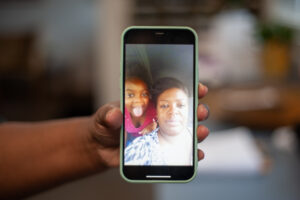
Lindy: What do conversations with your daughter look like in-between moments of having to call the police?
Erika: She’s pretty apologetic. She doesn’t like that she gets the way she does and doesn’t know how to control it. Other times, I try to help her see that one day she’s going to get older and I’m not going to be with her. She’s not going to be in a situation with a school IEP where people are going to handle her with oven mitts. One day, she’s gonna be in the real world having to manage her triggers. To be honest, I don’t have a lot of hope because she’s still so immature.
Sometimes she says she has to hold things together all day because she’s in a professional environment. And when she comes home, she doesn’t feel like she has to. But if she’s in college and has a roommate, she can’t get aggressive with them. So I’m afraid for her and that’s something that I told the psychiatric nurse practitioner when we saw her recently. I’m afraid when she leaves the house and nobody else is going to care when the police are called to say, “This is a mental health crisis. It’s not assault and battery.” They may not know that if it’s not said.
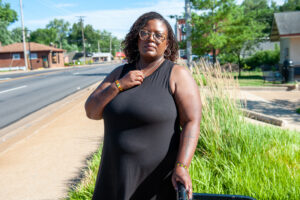
In St. Louis, my daughter got upset because I didn’t get her what she wanted for dinner. She was throwing things and knocking things over and breaking stuff. I said, “I’m not doing this.” I had to go outside and call 911 without my daughter hearing me because I didn’t want her to get more upset. When I called, the lady told me to call the North County non-emergency number. I was having trouble getting through, so I had to text one of my parishioners. I thought she’d understand.
I was like, “I need you to call North County Police and tell them my daughter’s having a mental health crisis and not to come with lights and sirens.” She did that and she told me she was on the phone saying, “She’s just a little girl. Please don’t hurt her.” It was horrible to have to call her for help because I didn’t want to be that vulnerable because of the power dynamic and leadership role. But I knew this lady had a 31-year-old Black man for a son who has autism and that she’s always afraid for him. So I knew she’d understand.
It took a very long time for the police to arrive but, eventually, they showed up. I was outside waiting for them. They came in. They saw the mess. And one went back to my daughter’s bedroom while one talked to me. They told me if I wanted to take her to the hospital, they could force her into the ambulance. Or, I could try myself. My daughter kept saying, “I’m fine, I’m fine.”
So they told me that in Missouri I had the right to discipline her and the right to defend myself. They were like, “Look at her. She’s as big as one of us. If she’s hitting you, you can defend yourself.” It was kind of a relief in some ways but, as a priest, I cannot afford for Child Protective Services to get involved if I was to hit my child back. And what if she says, “It wasn’t self-defense. She just hit me.” Then, no more priesthood, because I’ve hurt a child. So that’s one of my fears. If I have to defend myself and then I get in trouble with the law and lose my vocation?
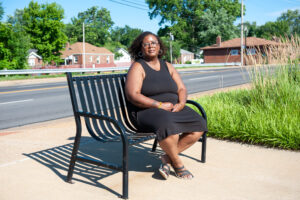
The police also gave me names and numbers for local mental health hospitals. Later, I saw one of the officers at a gas station near my house and thanked them again for how they handled the situation. I mean, if my daughter was still going, one of us could have hurt each other. Since then, there haven’t been other instances. She likes to cuss, and I hate that she does. Cursing is not cute. But, I have to pick my battles.
Ya know, I was the first Black woman ordained in the diocese of Northern Indiana in the Episcopal Church. Then I was the first woman ordained in the Anglican Diocese of Cape Coast in Ghana. So I think one day God will show me why He put me in this position and why I went from being a homeless person with no bachelor’s degree to going to Harvard and working at MIT. Maybe someday, somebody will listen to me. For now, I’m here. I’m just doing my part.
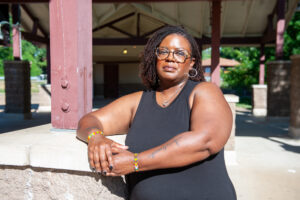
Lindy: What would you like to see in place when you need to call 911 for help?
Erika: We need more people trained in mental health first aid. We have all these neighborhood watches popping up. What if we had neighbors who are trained to respond to your calls for help? There’s an organization in St. Louis called Black Men Build. I’ve attended their meetings and they’re trying to train some of their members in mental health first aid so Black communities don’t have to call the police.
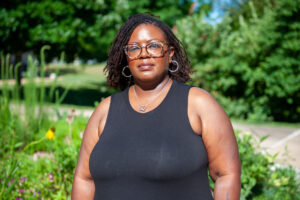
I know if I don’t speak up, and people who have lived through these experiences don’t speak up, then nobody will know that things need to change. I truly believe God calls all of us to use our lived experiences to help each other. I can’t not do anything just because I’m afraid of the police. When I do call them, it’s because I’m afraid I’m going to hurt my daughter or she’s going to hurt me and it’s not going to end well.
The lady who told me to call the police on my daughter was like, “Eventually, she’s going to learn.” Maybe. Or they’ll kill her or hurt her or put her in jail when she should be in a mental health facility. So I have to advocate for both of us. As a parent, I need support. And as a child with mental health disorders, my daughter needs support. I don’t know if more providers are needed, but there shouldn’t be five-month waiting lists. Then, instead of having to call 911, perhaps she’ll have learned coping skills in therapy and I would have time to learn them too to help her more.
I’m just getting plugged into the community, so I joined the Forward Through Ferguson governance board for the Racial Healing and Justice Fund. In our orientation, I met one of the ladies who has her doctorate of education. She said, “Don’t give up on your daughter. She’ll turn it around one day. I was there at one point, but I turned it around.” So I’m hoping that she finds her way.
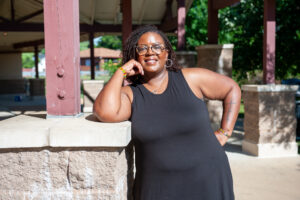
Lindy: What do you think you need at this point?
Erika: I just moved here, so I’m not soliciting sympathy. But it takes a village. I need a family therapist who doesn’t have a five-month waiting list. And I need a group of badass women to hang out with. I need time to just be me and not somebody’s priest or somebody’s mom. I need time to just be Erika. I need opportunities. I need spa time. I need facials. I need me time. My child is old enough to be left in the house for a few hours by herself. I need some girls’ nights out and some me time. That’s what I need.
And I hope my story helps somebody. The takeaway should be that if you really feel like you need to call the police, then you need to call. I know it’s a hard decision to make. And only you know what that feels like if you need to make that call. But there might come a time when you will have to make that call, for an adult or for a child, and trust that God is watching. I don’t want people to put themselves in danger because they’re so afraid to call.
We’re all God’s children and we all belong to one another. If anybody needs me or needs strength or needs to talk about a shared experience, I’m right here. We can share those experiences together. We can put together a parent support group. I’m game for all of it. As much as I need folks in the neighborhood, I’m here. And I got your back.
–
Reverend Erika L. Essiem is a member of the Racial Healing + Justice FundCommunity Governance Board.
Lindy Drew / Humans of St. Louis contributed to this photo story.
Note: This story was originally captured on April 6, 2022. Since then, Erika has left her position at St. Stephen’s Episcopal Church.
This story is a collaboration between Humans of St. Louis and Forward Through Ferguson for #Transforming911, an accountability and advocacy tool that examines St. Louis’ 911 system and serves as a call to reimagine public safety.
Learn more and get involved at transforming911.org.

